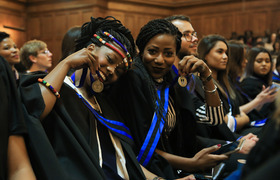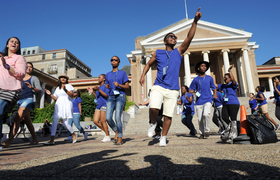Africa's call to UCT
06 June 2011 Welcome to Africa: International students participate in an African drumming session at UCT.
Welcome to Africa: International students participate in an African drumming session at UCT.
The relationship between South African universities and sister institutions across Africa has been topical for much of the past decade, writes deputy vice-chancellor Professor Thandabantu Nhlapo. At the University of Cape Town the matter has recently been thrown into sharp relief by the debates surrounding the Centre for African Studies and the proposal to form a new school that would provide a different platform for the study of Africa. A question that has been asked often is whether these debates have implications for, or may be able to draw from, UCT's declared goal to position itself as an Afropolitan university.
The Afropolitan vision is simple enough to describe: it is UCT's aspiration to embrace more meaningfully and more visibly our African identity and to play a significant continental role as one of Africa's leading institutions. We believe that we are well-prepared for such a role.
Our annual intake of international students is tilted heavily in favour of African students. In 2010, out of a total of 4 671 international students enrolled, 2 894 (62%) came from 35 African countries, with the majority of these (2 096) from the Southern African Development Community (SADC).
Over the years our scholarly engagements on the continent have been many and varied, including several hundred research collaborations that range from informal research partnerships to structured relationships within which joint work is formalised.
Many of these relationships are located in high-profile UCT flagship units and institutes, while others represent work that is quietly going on at departmental or individual level. This includes joint research and publications, external examinerships, student exchanges and capacity- building programmes in curriculum design.
A significant aspect of this involvement is direct capacity building for the region and for the continent, generally through the large numbers of SADC students who come through UCT (at the same fees as South Africans, in terms of the SADC Protocol), and through dedicated staff development programmes such as the University Science, Humanities, Law and Engineering Partnerships in Africa, better known as USHEPiA (see article on page 12).
The Afropolitan ideal aims to recognise this work, to support it and to give it more prominence, with the ultimate aim of consolidating UCT's place as an intellectual meeting point between South Africa, the rest of Africa, and the world.
But since this strategic goal was approved by Council in 2009, it has become increasingly clear that its implementation and its implications for UCT will be multi-layered and complex.
Viewed in this way, then, Afropolitanism at UCT stands on several pillars:
In the first place, the notion builds on the past efforts and successes that have led to the enviable reputation that UCT currently enjoys, and promotes the university as an exciting place to live and work. It celebrates work that is already taking place and helps us focus further on finding scholarly incentives for UCT academics to engage in research that looks to our continent, as well as to the global south, Europe or the US, in advancing their work. In other words, such work at UCT is not new, and this should be acknowledged.
This kind of Afropolitanism connotes a future-oriented approach to understanding Africa. It is based on the conviction that Africa is an important and distinctive area of study, as heterogenous as any other region in the world, and is extensively connected to the rest of the world.
This means that studying Africa can contribute profoundly and distinctively to understanding global issues and challenges, while at the same time facilitating powerful interventions on the continent itself.
Being an Afropolitan university in this way will mean specialising in studies on Africa, so that we are the place people come to study Africa - albeit not to the exclusion of other sites or kinds of research. As an Afropolitan university, UCT would become the centre for the study of issues of particular salience to the continent or where the continent offers special opportunities.
But apart from studies of particular local, regional and continental relevance, UCT - because of its academic quality - has another competitive edge. We are located on African soil, and we can bring a particular perspective and insight to our work on global issues that do not necessarily have an African focus.
This value is already being recognised, as is shown by the growing numbers of high-quality partnerships with leading institutions worldwide who seek us out precisely for this reason. Afropolitanism thus embraces not only what we do, but also who we are.
Linked to this, but quite distinctive as an aspect of this vision, is the need to increase the flow of African academics (as well as those from further afield) to UCT, while striving at the same time to create opportunities for our own academics to travel to the rest of the continent on scholarly business. We need students and staff to be exposed to the very best in the world by having eminent scholars visiting UCT to teach, write, conduct research or participate in public debates while making it possible for our staff and students to experience the vibrancy of the continent at first hand.
However, a distinction needs to be drawn between ordinary postgraduate and postdoctoral traffic, on the one hand, and other forms of strategic traffic, on the other. While the former contribute significantly to the Afropolitan profile of UCT, they reside firmly in the academic sphere of the faculties which will determine appropriate recruitment and enrolment strategies. Mobility of a more strategic kind will need to be investigated. and some creative ways will have to be found to resource it. As recent outward academic delegations (and others planned in the near future) have shown, this is one way of linking Afropolitanism more directly to UCT's intellectual project. The appointment by faculties of deputy deans responsible solely for internationalisation is another healthy sign.
The third pillar of the Afropolitan vision is also linked to the first one in that in acknowledging existing work, Afropolitanism seeks to promote and support this work through various kinds of resourcing. It is as important to support UCT academics to improve, deepen, expand or sharpen their continental projects and collaborations, as it is to expand the circle of engagements. There is no doubt that many of these existing collaborations are real jewels in the Afropolitan crown and deserve support, as do those colleagues and departments wishing to seek out new partnerships. It is worth noting that in the first round of awards (2009-2010) from the VC's Strategic Fund, 19 awards (about 50%) went to projects linked to this goal.
The concluding of institutional MoUs with African universities represents another thrust in the Afropolitan approach. For this to happen in a structured way, we need a policy framework that helps to clarify the rationale behind our choices, highlighting the options and assessing their merits on the basis of research and other intellectual considerations, as well as taking geopolitical, economic and other factors into account.
The Afropolitan vision must also recognise that there are many good reasons for firm partnerships with institutions situated within South Africa. In this respect we are in advanced discussions with several South African universities and with the Department of Higher Education and Training to promote effective collaboration internally.
As we reflect on Africa Day across the university I am confident that we will deepen our understanding of the total Afropolitan idea and its implications for UCT.
Every aspect of UCT's academic and operational life is touched by Afropolitanism. PASS departments have raised questions as to what Afropolitanism means for them.
The Human Resources Department will have it on their radar screen when they plan recruitment, appointment and remuneration policies; Student Affairs will have it in mind when they ponder their student housing and health offerings; ICTS will do the same in considering their delivery capacity, as will Properties and Services in thinking about physical plant, including short- and long-term housing. So will the Finance Department, over a range of money and sustainability matters. The Institutional Planning department, the admissions and recruitment people, the Postgraduate Funding Office and the UCT Libraries will reflect on the possibilities opened up by this approach, and of course IAPO will be central to the implementation. The Development and Alumni Department will have an interest in identifying funding opportunities for the project.
Many of these reflections will inevitably come back to the issue of resources.
As a final word, it should be acknowledged that, in the greater scheme of things, we cannot do this alone. It is crucial to engage the Department of Higher Education and Training, the Department of Science and Technology, the Department of Home Affairs, and regional and continental bodies such as the Southern African Regional Universities Association (SARUA) and the Association of African Universities (AAU), who themselves are now quite alive to the need for universities to use continental partnerships as a real driver for the development, not only of the higher education sector but of African populations as a whole.
 This work is licensed under a Creative Commons Attribution-NoDerivatives 4.0 International License.
This work is licensed under a Creative Commons Attribution-NoDerivatives 4.0 International License.
Please view the republishing articles page for more information.










